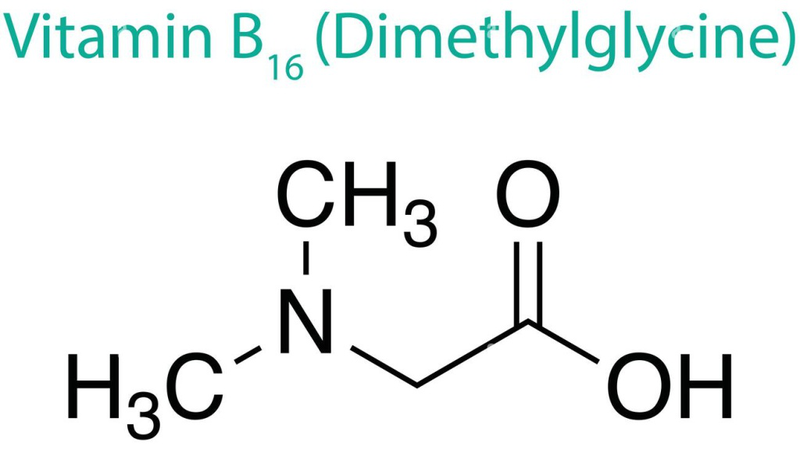Vitamin B16 is a less common B vitamin, classified based on its chemical structure. In this article, let’s learn more about this vitamin!
Vitamin B16 is known as a natural amino acid found in plant and animal cells and many foods. This vitamin is used as a method to support immune function, control disorders such as epilepsy, autism and many other health benefits.
Learn about the structure and properties of vitamin B16
Vitamin B16, also known as dimethylglycine (DMG), is a derivative of the amino acid glycine, with a chemical structure similar to water-soluble vitamins. The structural formula of vitamin B16 is (CH3)2NCH2COOH. In the body, the small intestine absorbs vitamin B16 and then the liver converts it into other useful metabolites. Vitamin B16 also functions as a building block for DNA, amino acids, neurotransmitters, and hormones.

Vitamin B16 has the structural formula (CH3)2NCH2COOH
Vitamin B16 is commonly found in some foods such as beans, cereals, onions, tomatoes, etc., but in very small amounts. In addition, it is also produced from the process of choline metabolism in the body. Vitamin B16 is considered an antioxidant and increases oxygen consumption at the cellular level.
However, vitamin B16 is not one of the common B vitamins such as B1 (thiamine), B2 (riboflavin), or B12 (cobalamin). In fact, vitamin B16 has not been officially recognized by scientists as a vitamin and a deficiency of vitamin B16 in the diet does not cause any side effects.
The role of vitamin B16 in human health
Up to now, vitamin B16 has not had any specific effects recognized through clinical trials. However, vitamin B16 is said to bring some good health benefits when used properly. Some typical benefits include:
- Improving the immune system: Some studies have shown that vitamin B16 can enhance humoral and cell-mediated immune responses. In addition, vitamin B16 also helps improve oxygen utilization when hypoxia occurs and reduces lactic acid buildup during stress.
- Control autism and epilepsy: Some studies have suggested that vitamin B16 is also thought to reduce the buildup of lactic acid in your blood during stress, helping to prevent seizures and control autism. In addition, vitamin B16 can also stimulate nerve function.
- Improve brain health: Many people who use vitamin B16 have found it to help reduce stress, anxiety, improve concentration, memory and thinking ability. In addition, vitamin B16 is also thought to reduce the risk of age-related diseases such as Alzheimer’s.
- Increased energy and stamina: Vitamin B16 is believed to increase energy and improve stamina. Many people use vitamin B16 as a way to support physical and mental performance. By improving energy metabolism, vitamin B16 can help the body function more efficiently.
- Support cardiovascular health: Vitamin B16 is believed to have certain effects on cardiovascular health. Many studies have shown that vitamin B16 can help improve cardiovascular health by reducing blood cholesterol levels and maintaining stable blood pressure.
- Support cell and tissue health: Vitamin B16 helps maintain the health of cells and tissues in the body, helping them function more effectively.

Vitamin B16 has the ability to enhance the body’s immune response.
However, it should be noted that claims about the benefits of vitamin B16 are still under investigation and have not been proven by the FDA. The use of any supplement should be discussed and guided by a doctor or nutritionist to ensure safety for health.
How vitamin B16 works
Vitamin B16 helps improve physical performance and exercise by increasing oxygen utilization and reducing lactic acid formation in the body. In addition, vitamin B16 also enhances immune responses through cells and humoral mediators.
For autism, attention deficit hyperactivity disorder, and epilepsy, the mechanism of action of vitamin B16 is still unclear. However, some studies indicate that vitamin B16 may affect metabolism and immune responses, which may contribute to improving symptoms of these conditions.
In cancer research, vitamin B16 has been used as an ester to increase the solubility and bioavailability of some prodrugs. However, vitamin B16 is not considered an active moiety and there is no evidence that it has anti-tumor effects.
Dr. Meduski of the University of Southern California has called vitamin B16 a “metabolic enhancer” due to its ability to improve cellular metabolism, promote oxygen utilization, and enhance a stronger immune response.
How to supplement vitamin B16 for the body
Like other B vitamins, the human body cannot synthesize vitamin B16 on its own and must be supplied through the diet. Adjusting and building a reasonable diet plays a very important role in helping to ensure adequate vitamin B16 supply for the body.
To supplement vitamin B16, you can incorporate foods such as beans, cereals, etc. into your daily diet. These foods not only provide vitamin B16 but also contain many other nutrients that help maintain overall health.

Vitamin B16 can be supplemented through functional products.
However, supplementing vitamin B16 from food does not always ensure adequate supply of the body’s needs. In this case, you can use supplements or functional products containing vitamin B16 to provide the body. Vitamin B16 is often sold in capsule or powder form. The specific dosage may vary depending on the purpose of use and health status of each person. But to ensure safety and effectiveness, please consult your doctor or nutritionist before using any supplement, especially for those with specific health problems or are using other medications.
Maintaining a balanced and varied diet will help ensure adequate supply of vitamin B16 and other nutrients to the body, helping to maintain stable health.
Research Status and Applications of Vitamin B16 in Medicine
Currently, vitamin B16 has attracted the attention of many researchers and health professionals, but these studies are still limited. Although there have been some studies conducted on the effects of vitamin B16 on health, most of them are small studies and there is not much evidence to show the effectiveness and safety of this vitamin.
Some animal studies have suggested that vitamin B16 may have health benefits, including improving the immune system and increasing strength. However, more large-scale studies in humans are needed to more clearly determine the effects of vitamin B16 and safe doses.
More clinical research is needed to evaluate the benefits and risks of vitamin B16 for specific health conditions, as well as to better understand its mechanism of action in the human body.

More clinical research is needed to evaluate the benefits of vitamin B16.
Overall, although vitamin B16 has potential benefits, its use should still be considered carefully. Users should consult a doctor before starting any supplement, including vitamin B16, to ensure safety and effectiveness!





